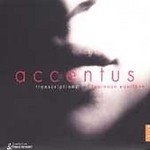
MARBECKS COLLECTABLE: Accentus-Transcriptions
 $36.00
Low Stock
add to cart
$36.00
Low Stock
add to cart
BARBER / MAHLER / BACH / CHOPIN / RAVEL / etc
MARBECKS COLLECTABLE: Accentus-Transcriptions
Accentus Chamber Choir / Laurence Equilbey
[ Naive / CD ]
Release Date: Saturday 24 April 2004
Editor's Choice Gramophone Magazine (Awards Issue 2003)"Stunning displays of choral technique and control make this a disc to savour."
Editor's Choice Gramophone Magazine (Awards Issue 2003)
"Stunning displays of choral technique and control make this a disc to savour."
Samuel Barber wrote his Agnus Dei in 1967 following a suggestion that he turn the ever-popular Adagio for Strings into a choral work. Technically, then, it's not a real transcription, but that's not how Laurence Equilbey sees it. She goes all out to coax from her singers a powerful recreation of string playing, both through phrases which are shaped just as string-players would bow them and by making each entry imitate the actual effect of a bow as it first touches the string. It's a stunning display of choral technique and control, which serves merely as a taster for some extraordinarily accomplished singing.
Equilbey's back-to-roots approach is equally dramatic in Gérard Pesson's ravishing choral arrangement of the Adagietto from Mahler's Fifth Symphony. There is a decidedly orchestral feel to this with, again, compellingly shaped phrasing of the long sustained lines and some seemingly effortless excursions into the stratosphere by the Accentus sopranos. Knut Nystedt's Immortal Bach, more original work than transcription, transforms the choir into a kind of other-worldly organ, sustaining unwavering pianissimo chords apparently for ever. For my money, though, the most rewarding items here are the two Chopin transcriptions, which both convey awareness of the music's pianistic origins while convincing completely as choral music: testament, certainly to Franck Krawczyk's sensitive transcriptions, but even more to the extraordinary vocal flexibility of Accentus and the perceptive musicianship of their conductor.
Only once does the music call for any unconventional effect - Clytus Gottwald incorporates some subtle whistling in his magical recreation of Ravel's Soupir - which makes Accentus's achievement in creating such an array of colours and tonal variety all the more astonishing. The absence of comprehensive booklet notes is the only drawback of an otherwise magnificent release."
(Gramophone)
Tracks:
Bach:
Musicalisches Gesang-Buch G. C. Schemelli,BWV439-488 - Komm, süsser Tod, BWV478 (melody by Bach)
Barber:
Agnus Dei,Op. 11.
Berg:
7 Early Songs - Die Nachtigall (wds. Storm)
Chopin:
27 Etudes,Opp. 10, 25 and posth - E flat minor, Op. 10/6 Sonata for Piano No 3,Op. 58 - Largo
Debussy:
Les Angélus.
Mahler:
Symphony No 5 - Adagietto
5 Rückert-Lieder - No. 4, Ich bin der Welt abhanden gekommen
Ravel:
3 Poèmes de Stéphane Mallarmé - Soupir
Wolf:
Mörike Lieder -
Das verlassene Mägdlein
Auf ein altes Bild

